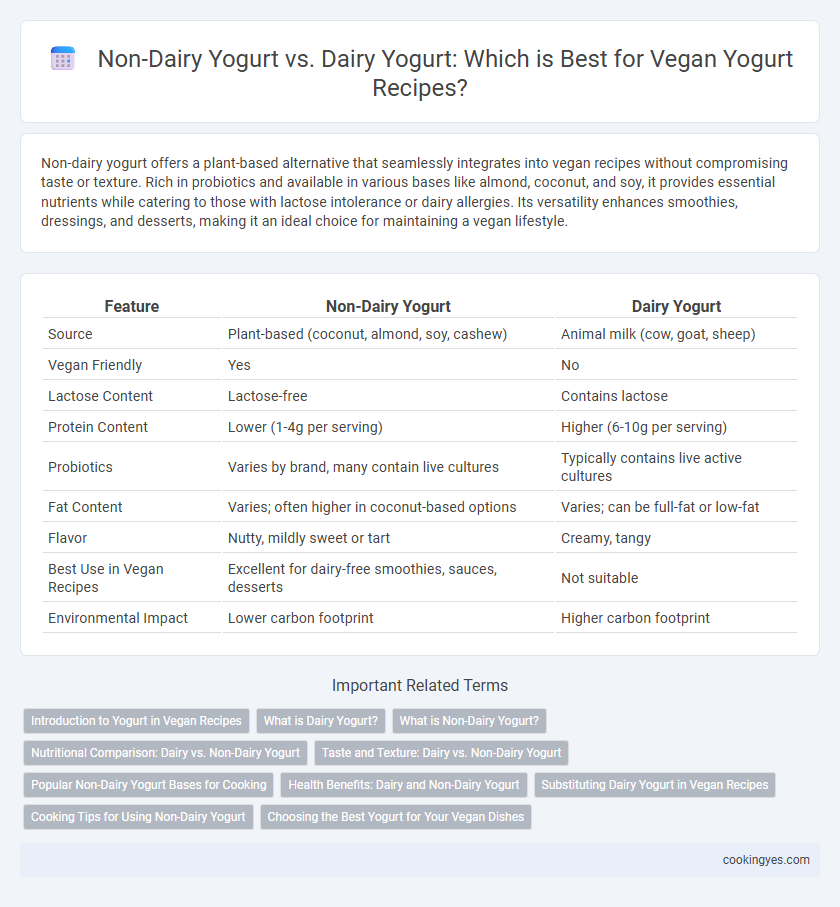Non-dairy yogurt offers a plant-based alternative that seamlessly integrates into vegan recipes without compromising taste or texture. Rich in probiotics and available in various bases like almond, coconut, and soy, it provides essential nutrients while catering to those with lactose intolerance or dairy allergies. Its versatility enhances smoothies, dressings, and desserts, making it an ideal choice for maintaining a vegan lifestyle.
Table of Comparison
| Feature | Non-Dairy Yogurt | Dairy Yogurt |
|---|---|---|
| Source | Plant-based (coconut, almond, soy, cashew) | Animal milk (cow, goat, sheep) |
| Vegan Friendly | Yes | No |
| Lactose Content | Lactose-free | Contains lactose |
| Protein Content | Lower (1-4g per serving) | Higher (6-10g per serving) |
| Probiotics | Varies by brand, many contain live cultures | Typically contains live active cultures |
| Fat Content | Varies; often higher in coconut-based options | Varies; can be full-fat or low-fat |
| Flavor | Nutty, mildly sweet or tart | Creamy, tangy |
| Best Use in Vegan Recipes | Excellent for dairy-free smoothies, sauces, desserts | Not suitable |
| Environmental Impact | Lower carbon footprint | Higher carbon footprint |
Introduction to Yogurt in Vegan Recipes
Non-dairy yogurt made from almond, coconut, or soy provides a creamy, dairy-free alternative in vegan recipes, enhancing texture and flavor without animal ingredients. Probiotic-rich non-dairy yogurt supports gut health while fitting plant-based diets, unlike traditional dairy yogurt which contains lactose and animal proteins. Choosing non-dairy yogurt enables vegan dishes to maintain nutritional benefits and versatile culinary uses essential for plant-based cooking.
What is Dairy Yogurt?
Dairy yogurt is a fermented dairy product made from milk, typically cow's milk, using live bacterial cultures that convert lactose into lactic acid, creating a creamy texture and tangy flavor. It provides essential nutrients such as calcium, protein, and probiotics that support digestive health and bone strength. In vegan recipes, dairy yogurt is often substituted with plant-based alternatives to accommodate dietary restrictions and ethical preferences.
What is Non-Dairy Yogurt?
Non-dairy yogurt is a plant-based alternative to traditional dairy yogurt, made from ingredients like almond, coconut, soy, or oat milk that undergo fermentation with live cultures. It provides a creamy texture and probiotic benefits similar to dairy yogurt, making it a suitable choice for vegan recipes and those with lactose intolerance. Rich in nutrients depending on the base ingredient, non-dairy yogurt supports diverse dietary needs while enhancing the flavor and nutrition of vegan dishes.
Nutritional Comparison: Dairy vs. Non-Dairy Yogurt
Non-dairy yogurt, often made from almond, coconut, or soy, typically contains fewer proteins and calcium than dairy yogurt but offers lower saturated fat and cholesterol, aligning with vegan dietary needs. Dairy yogurt is richer in probiotics, protein, and essential nutrients like vitamin B12, crucial for muscle repair and overall health. Choosing non-dairy yogurt fortified with calcium and vitamin D supports vegan nutrition while accommodating lactose intolerance and ethical preferences.
Taste and Texture: Dairy vs. Non-Dairy Yogurt
Non-dairy yogurts, made from almond, coconut, soy, or oat milk, often have a creamier texture and slightly nutty or fruity flavor compared to traditional dairy yogurt. Dairy yogurt typically offers a tangier taste and smoother, denser consistency due to lactose fermentation and milk proteins like casein. Taste and texture variations impact vegan recipes by influencing recipe moisture content, flavor balance, and mouthfeel, making non-dairy yogurts versatile alternatives in plant-based cooking.
Popular Non-Dairy Yogurt Bases for Cooking
Popular non-dairy yogurt bases for vegan recipes include coconut, almond, soy, and cashew yogurts, each offering unique textures and flavors suitable for various cooking applications. Coconut yogurt provides a creamy consistency and natural sweetness, ideal for desserts and smoothies, while soy yogurt offers higher protein content, making it a versatile option for savory dishes. Almond and cashew yogurts deliver rich, nutty profiles that enhance dressings, dips, and baked goods without the lactose and cholesterol found in dairy yogurt.
Health Benefits: Dairy and Non-Dairy Yogurt
Non-dairy yogurt, made from ingredients like almond, coconut, or soy, offers probiotics and is free from lactose, making it suitable for vegans and those with dairy sensitivities. Dairy yogurt typically contains higher levels of protein and calcium, contributing to bone health and muscle maintenance. Both yogurt types promote gut health through live cultures, but non-dairy options often contain added sugars and fortifications to match the nutritional profile of dairy yogurt.
Substituting Dairy Yogurt in Vegan Recipes
Non-dairy yogurt, crafted from ingredients like coconut, almond, or soy, offers a creamy alternative that aligns well with vegan recipes, providing similar textures and tangy flavors without animal products. When substituting dairy yogurt, choosing unsweetened varieties ensures compatibility with a wide range of savory and sweet dishes while maintaining nutritional balance. This substitution supports vegan dietary needs and satisfies those with lactose intolerance or dairy allergies, enhancing recipe inclusivity and taste integrity.
Cooking Tips for Using Non-Dairy Yogurt
Non-dairy yogurt made from almond, coconut, or soy milk offers a creamy texture ideal for vegan recipes, enhancing flavors without the dairy aftertaste. When cooking, use unsweetened varieties to maintain control over sweetness and add thickening agents like agar agar or tapioca starch if a firmer consistency is needed. Non-dairy yogurt performs best when added towards the end of cooking to preserve its probiotic benefits and prevent curdling in hot dishes.
Choosing the Best Yogurt for Your Vegan Dishes
Non-dairy yogurt, made from almond, coconut, soy, or oat milk, offers a creamy texture and probiotic benefits ideal for vegan recipes, while avoiding animal-derived ingredients found in dairy yogurt. When choosing the best yogurt for your vegan dishes, prioritize options with live active cultures and minimal added sugars to enhance flavor and nutritional value. Plant-based yogurts fortified with calcium and vitamin D also support a balanced diet, making them a superior choice for health-conscious vegans.
Non-dairy yogurt vs dairy yogurt for vegan recipes Infographic

 cookingyes.com
cookingyes.com